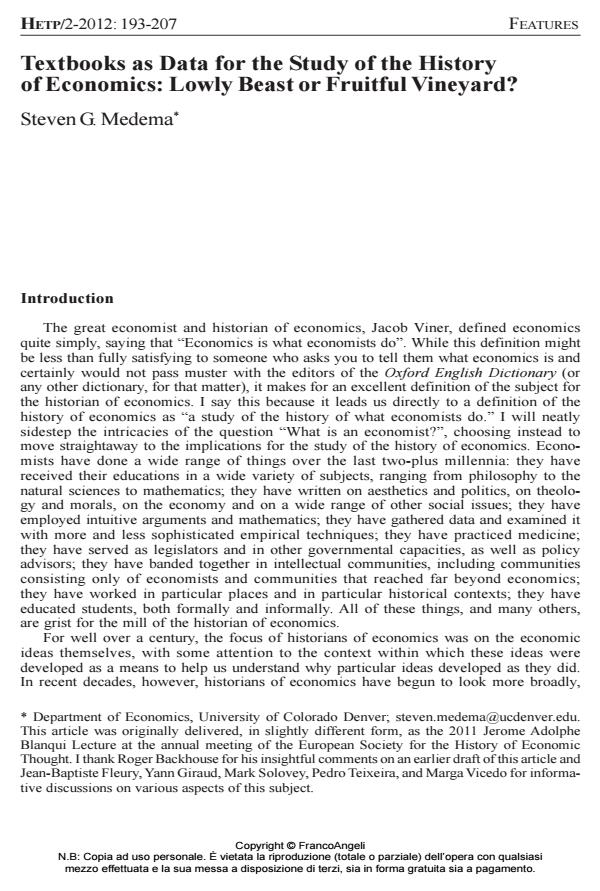Textbooks as Data for the Study of the History of Economics: Lowly Beast or Fruitful Vineyard?
Titolo Rivista HISTORY OF ECONOMIC THOUGHT AND POLICY
Autori/Curatori Steven G. Medema
Anno di pubblicazione 2012 Fascicolo 2012/2
Lingua Inglese Numero pagine 15 P. 193-207 Dimensione file 230 KB
DOI 10.3280/SPE2012-002012
Il DOI è il codice a barre della proprietà intellettuale: per saperne di più
clicca qui
Qui sotto puoi vedere in anteprima la prima pagina di questo articolo.
Se questo articolo ti interessa, lo puoi acquistare (e scaricare in formato pdf) seguendo le facili indicazioni per acquistare il download credit. Acquista Download Credits per scaricare questo Articolo in formato PDF

FrancoAngeli è membro della Publishers International Linking Association, Inc (PILA)associazione indipendente e non profit per facilitare (attraverso i servizi tecnologici implementati da CrossRef.org) l’accesso degli studiosi ai contenuti digitali nelle pubblicazioni professionali e scientifiche
Historians of economics have paid minimal attention to the diffusion of economic ideas in the textbook literature. Given the low esteem in which textbooks are held as embodiments of scholarship and the propensity of historians of economics - and intellectual historians generally - to focus on the production of scholarship through more lofty venues such as journal articles and scholarly books, this lack of attention to the textbook literature is in some ways understandable. This article argues that the textbook literature constitutes an incredibly rich data source for the historian of economics. In doing so, it offers illustrations from the treatment of the Coase theorem in the textbooks, with a view both to showing how the textbook literature enhances our understanding of the diffusion of economic ideas and how attempts by authors to grapple with new ideas in the context of the textbook literature can result in divergences between how these ideas are treated in the scholarly and textbook literatures.
Parole chiave:Textbooks, Coase theorem, historiography, education, diffusion
Jel codes:B0
- Textbooks in the History of Recent Economics Yann Giraud, in History of Political Economy /2018 pp.579
DOI: 10.1215/00182702-7023518 - Paul Samuelson, gender bias and discrimination Roger E. Backhouse, Béatrice Cherrier, in The European Journal of the History of Economic Thought /2019 pp.1053
DOI: 10.1080/09672567.2019.1632366 - Conquering or mapping? Textbooks and the dissemination of human capital theory in applied economics Pedro Teixeira, in The European Journal of the History of Economic Thought /2018 pp.106
DOI: 10.1080/09672567.2017.1415948 - The Textbook Reception of Pigouvian Externality Analysis, 1946–1980 Nahid Aslanbeigui, in History of Political Economy 11948217/2025
DOI: 10.1215/00182702-11948217 - Lionel Robbins on the principles of economic analysis – the 1930s lectures Pedro N. Teixeira, in The European Journal of the History of Economic Thought /2020 pp.335
DOI: 10.1080/09672567.2020.1741927 - Musgrave, Samuelson, and the Crystallization of the Standard Rationale for Public Goods Maxime Desmarais-Tremblay, in History of Political Economy /2017 pp.59
DOI: 10.1215/00182702-3777158 - THE HISTORY OF THE HISTORY OF ECONOMICS SOCIETY Marianne Johnson, in Journal of the History of Economic Thought /2024 pp.498
DOI: 10.1017/S105383722400049X
Steven G. Medema, Textbooks as Data for the Study of the History of Economics: Lowly Beast or Fruitful Vineyard? in "HISTORY OF ECONOMIC THOUGHT AND POLICY" 2/2012, pp 193-207, DOI: 10.3280/SPE2012-002012